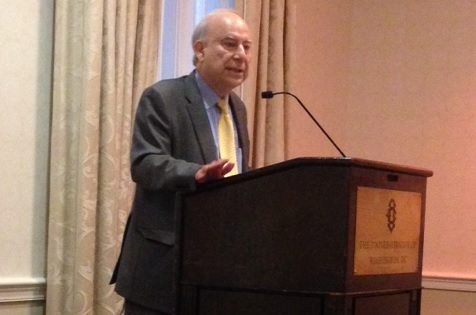Akbar Ahmed introduces core Muslim tradition to DC audience.
By Patrick Burnett
The University Club of Washington, DC’s International Committee graciously hosted a wonderful talk by Ambassador Akbar Ahmed and a delicious Iftar dinner of the customary dates, Moroccan Hariri soup, Lamb Tagine, and baklava, on June 24, attracting distinguished guests from the prominent private Washington club, including key officials from the Pentagon and the German Embassy.
Ahmed, the Ibn Khaldun Chair of Islamic Studies at American University and the former Pakistani High Commissioner to the UK, took the opportunity to introduce and tie together his Sufi-influenced poetry with the roles of love and ‘ilm’ in Islam for this prominent audience. Ahmed also explained the significance of Ramadan and the month’s beautiful and selfless traditions to this mostly non-Muslim audience, while also emphasizing how fasting unites all of us within the world’s faiths. Fasting as a means to deeper spirituality is not exclusive to Islam, but all the world’s great religions — whether the Abrahamic faiths, Hinduism, or Buddhism.
GUEST BLOG
International Committee Chair Kathy Bailey introduced Ahmed by playfully remarking, on the 27 books he has authored, “Another one may have been written since this morning [at the rate which he writes].” From there, Ahmed played the readings of two of his own poems, including “At the Khaiber Pass,” a poem reflecting on the ebb and flow of empires and the cycles of history, and “What is it that I seek?” which reflects on the power of love and how love and compassion are the “God’s greatest gift[s].”

Ahmed’s engaging lecture touched upon a number of important themes relating to love, ilm, Ramadan, and contemporary Islam more broadly. Key among his points was the importance of Ramadan for withdrawing from everyday distractions to reflect on God’s presence in the world and to show love and compassion to others. In an effort to show the audience just how mainstream Ramadan has become in official circles, Ahmed told the story of attending the first Ramadan ever held by the White House under President George W. Bush, and how the menus each featured a painstakingly hand-painted crescent, showing true dedication by the White House to the event. He also told the story of the Israeli Embassy of Washington’s first Ramadan, for which the ambassador cleared out his entire dining room so guests could pray before the Iftar.
Perhaps most importantly, Ahmed explained how reading, knowledge, and understanding are so central to Muslim theology and culture, and how shameful that many in the modern Middle East have lost sight of this truth. As Ahmed explains, Muslim societies have a long history of advancement. The period of La Convivencia in Andalusia, for one, featured some of the greatest knowledge production in Muslim history. The audience was particularly surprised to learn that in the 800s, the library in Cordoba held 400,000 books, as a library in Switzerland held only 800. As Ahmed emphasizes, this is particularly startling when one considers that Harvard today outpaces the entire Middle East in the volume of technical writing.
Ahmed’s talk concluded with remarks on his latest project, Journey Into Europe: Islam, Immigration, and Empire, and how it harkens to some of the big questions facing both Muslim and Western civilizations today. Namely, Ahmed spoke of the deep humanitarian challenges we all face as refugees flow into Southern Europe from Africa and the Middle East, and how their humanity continues to be abused in their destination countries much as it was in their home countries.
To further illustrate this important point, Ahmed told the story of Ahmedu, a Gambian boy he met in Sicily who fled for Europe as the political and economic situation in the Gambia descended into chaos. Ahmedu’s encounter with Ahmed and the team was the first time in a long time he felt treated with respect, dignity, and compassion, having been abused by authorities left and right in his journey to Italy. Treating our fellow man with dignity and respect is one of the most important lessons one can gather from the time of Ramadan, whether one is a practicing Muslim, a Catholic like myself, or of any other religious or philosophical background.
The audience was very impressed with the talk, and was very eager to engage Ahmed in the question and answer session. Such questions as policy recommendations for keeping marginalized Muslim youth from being radicalized and traveling to Syria, the role of ignorance in evil deeds, and a clarification of the individual’s role in Islam versus Christianity.
As guests broke the fast with dates and a bread and cheese plate, the audience at the University Club had much to reflect on in this month of Ramadan, including how they too can take the lessons of Islam and apply them to their everyday life, whether in working for the US Department of Agriculture, Congress, or any other influential Washington office. Ramadan truly can bring together any people with an open heart.
(Patrick Burnett is a Research Assistant to Akbar Ahmed, the Ibn Khaldun Chair of Islamic Studies at American University.)



